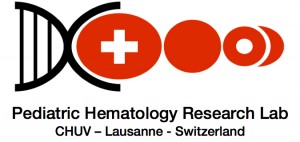
The Pediatric Hematology Research Laboratory @ CHUV in Lausanne, Switzerland investigates red blood cell disorders affecting children, mostly diseases involving the production and function of haemoglobin. Currently, we are working on a SNSF-funded project in collaboration with the Swiss Federal Institute of Technology (EPFL), the University of Lausanne and Boston Children’s Hospital – Harvard Medical School (USA) on sickle cell disease (Project #1). In the near future, we plan to open a program and platform for gene therapy in hemoglobinopathies (in collaboration with Prof. Fabio Condotti, Division of Immunology, CHUV-UNIL) (Project #2).
Project #1: Mapping the cellular surfaceome of healthy and Sickle Cell Disease erythropoiesis: setting the basis for targeted lineage- and stage-specific red blood cell therapies
Sickle cell disease (SCD), a genetically inherited ?-hemoglobinopathy, is caused by a single nucleotide mutation in the HBB gene. This alteration is responsible for dramatic changes in erythrocyte shape and function ultimately causing acute and chronic vaso-occlusive/ischemic complications affecting multiple organs (kidney, brain, lung and other). In addition to a significant morbidity and mortality, disease-associated social stigmatization and economic burden are causing children and adults with SCD (and their families) to lead lives of significantly limited quality. In a bleak therapeutic landscape mostly achieving adequate supportive care, novel targeted molecular therapies could provide much needed hope for curative interventions in SCD. Hitherto, technical limitations have hindered surface antigen landscape mapping during erythropoiesis, which could accellerate the study of erythroid development from hematopoietic stem cells (HSCs) and the development of lineage- and disease-specific targeted therapies for red cell disorders. With the recent advances in proteomics and the progress in differentiating human erythroid cells ex-vivo, new research avenues have become available for exploration. We plan to use next-generation proteomics to continue expanding our knowledge of SCD and its pathogenesis, as well as establish of a platform to design targeted therapeutic agent delivery (chemical compounds incl. cytokines and hormones, DNA/RNA vectors, nanoparticles, drug conjugates, etc) for many diseases of erythropoiesis.
Project #2: Human gene therapy for hemoglobinopathies: an international collaborative research project (in collaboration with Prof. Fabio Candotti, Division of Immunology, CHUV and international partners)
Somatic human gene therapy (HGT) has recently entered the clinical arena. Several trials have proven safety and efficacy for a subset of well-defined inherited disorders of hematopoiesis. Switzerland, via its academic medical centers, has the mission and resources (both scientific & infrastructural) to play a significant role in providing patients affected by inherited disorders access to innovative cellular and genetic therapies. In sickle cell disease (SCD), correction of the affected gene or addition of an anti-sickling hemoglobin has been proven feasible, safe and effective in recent pre-clinical studies and clinical trials.
Building a translational platform will facilitate the implementation of clinical HGT. In this project, we aim to establish and develop translational research in Pediatrics centered on non-malignant disorders of hematopoiesis at the University Hospital of Lausanne. We aim to study (phase 1) and implement clinical HGT trials (phase 2) for patients with SCD, both of which are recognized model disorders for HGT. We also will investigate the effects of pre-HSCT conditioning prior to hematopoietic stem cell infusion on SCD erythropoiesis. Ultimately, such platform would allow the effective translation of relevant basic biological findings into new therapies for children and adults suffering from devastating and neglected blood disorders.
